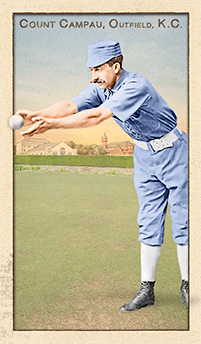
- Series: Beginnings: 1880's
- City: Kansas City
- Team: Blues (WA)
- League: Western Association
Charles Columbus Campau (1863-1938) may have been dubbed “The Count,” but he was the King of the Minors in the 19th century. No one matched his offensive output and he was prized especially for his defense. The scion of the French-Canadian founders of his native Detroit, Campau reigned in the society of the city and its ball fields. Educated at Notre Dame, he began playing there at an early age and soon came to dominate with his power and speed. He left Detroit with mentor Al Buckenberger to begin his pro career with Erie of the Interstate League in 1884. Thus began a two-decade tenure, mostly in the minors, that would take the Count to twenty different clubs including brief stints in the majors. His debut was back home with the Wolverines filling in for an injured Sam Thompson in ‘88. He stayed on with the newly constituted International League version of the Wolverines the following season and would have but one more turn in the big leagues, with the Browns in 1890 (save for two games with the Senators in ‘94). This would allow the hard-hitting Campau to claim a rare (unique?) distinction of leading the (minor league) International League and (major league) American Association in home runs in the same season. Charlie was known for his leadership skills and often served as on-field manager. Browns' owner Chris von der Ahe used him so in St. Louis that year and would call him “the best captain I have ever had.” Campau’s batting average could fluctuate, but his speed steadily improved to the point he was running foot races for prizes and was reputed to have never lost a match. The sketchy data of minor league stolen bases leaves a lot unknown but his feats were legendary. He swiped 100 bases in ‘87 and was renowned for a “home run” he hit by rounding the bases on a muffed pop-up in front of the plate.
- Campau continued in the minors through the 1905 season and umpired the following year. Never losing his love for speed, Charlie retired and went into the horse racing business and worked around the nation’s tracks in various capacities the rest of his life
- von der Ahe had sacked his prized manager for faithfully enforcing the owner’s own rules. The Count got a bit of revenge the next day, hitting an inside-the-park grand slam to the delight of St. Louis fans who rained down a deluge of cigars. Enough, Campau said, to open his own store
- Campau enjoys five known poses in the Old Judge canon
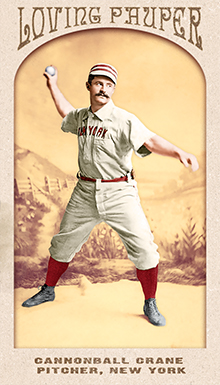
- Series: 1880s: Loving Paupers
- City: New York
- Team: Giants
- League: National League
Edward Nicholas Crane (1862-1896) began in major league ball with the notorious Boston Reds of the Union Association - a hard-drinking crew. It appears that big Ed avoided the bottle that would eventually kill him years later when he joined Al Spalding’s world exhibition tour. That he even made that trip was highly unlikely as Cannonball had labored in anonymity for years until the 1889 “World Series,” where Jim Mutrie played a hunch and decided his Giants could best the Bridegrooms with fastballs. Crane was tapped for five starts, won four and the Series. Cannonball could always throw hard and was famed for a 406’ long-toss, but such post-season heroics were virtually unheard of. The seeds of Ed’s doom had been planted on that tour however, nourished by the vices of Paris. All too soon he would spiral into alcoholism and an early death. While the coroner ruled Crane's death an accidental overdose, rumors persisted that he had taken his own life by drinking acid.
- Ed had one of the great seasons of any pitcher for the Toronto Maple Leafs in ‘87 with 33 wins and an eye-popping .428 BA (when walks counted as hits)
- Other firsts: 1st NY Giant to hurl no-hitter; 1st pitcher with four Ks in an inning
Auction History
Cartophilia
Old Judge Pose: 96-6
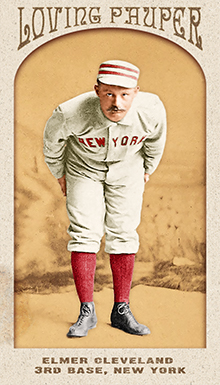
- Series: 1880s: Loving Paupers
- City: New York
- Team: Giants
- League: National League
Elmer Ellsworth Cleveland (1862-1913) was a third baseman and shortstop who was a good enough hitter to carve out a very respectable pro career, principally in the minors. He began with Johnstown of the Western Interstate League in 1883 and, as so many of his talent and age, got a chance at the “big leagues” the following season with the Cincinnati Outlaw Reds, the aptly-named club in the upstart Union Association. Elmer actually had a great season for Cincy playing against other mostly minor league talent. He hit .322 in 29 games. His limitations as a hitter caught up to him in his future appearances with major league teams. He next came up with the New York Giants in 1888, getting into nine games before being shipped to Pittsburgh's Alleghenys where he got into 30 games. His combined average tumbled to .235. Cleveland got one more shot, with the Columbus Solons of the American Association in 1891 where his miserable .171 average signaled the end of any dreams of big league glory. Nevertheless, he stayed in minor league baseball through his twenties, finally calling it quits after playing the 1892 season back in Johnstown with the Pirates, now in the Pennsylvania State League and finishing up the year with Danville in the same circuit. His opponents that year included the Wilkes-Barre Coal Barons, the Reading Actives and the Lebanon Pretzel Eaters.
- Cleveland must have cut an imposing figure in that era, standing 5'11” and tipping the scales at 190 lbs. However, the sturdy third baseman learned the unfortunate consequences of not hitting one's weight
Auction History
Cartophilia
Old Judge Pose: 80-2
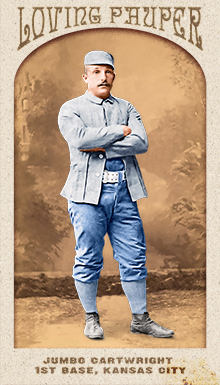
- Series: 1880s: Loving Paupers
- City: Kansas City
- Team: Blues (WA)
- League: Western Association
Edward Charles Cartwright (1859-1933) was built to anchor first base and, once he finally made it to the majors at age 30, he did just that; first for the Browns in 1890 and then for four straight seasons with the Washington Senators of the National League from '94-97. The stocky 5'10” 220 lb infielder hit well until his final season, better than he had in the minors. His rookie year saw him hit .300 while driving in 60 runs. After a three-year hiatus, he continued his excellent offense, highlighted by a .331 average in 1895. He carried his weight well, evidenced by the fact he still ranks 13th all-time among base stealers who played for D.C. teams. Jumbo began with Youngstown in 1883 and had one season -1886- with the Acid Iron Earths in Mobile for the Gulf League, one of the more intriguingly-named clubs in the universe of minor league baseball that had some doozies. He was with New Orleans in '87 then Kansas City and St. Joseph (another of those tantalizingly-dubbed clubs-the Clay Eaters) before heading north to Montreal in the International Association to begin the 1890 campaign prior to his call to St. Louis for his MLB debut. Despite hitting .300 in 75 games for the Browns, Ed was sent west where he played for San Francisco, Tacoma and Missoula before returning closer to home with Memphis for the '93 season. He was released by the Senators in mid-1897 and played a few more games with the Minneapolis Millers as his pro career came to an end.
- Jumbo had a game whose output at the plate justified his nickname. On September 23, 1890 he drove in seven runs in one inning, setting a mark that would stand for 109 years until another St. Louis warrior, Cardinal Fernando Tatís, hit two grand slams off the Dodgers' Chan Ho Park in the third inning on April 23, 1999
Auction History
Cartophilia
Old Judge Pose: 70-1
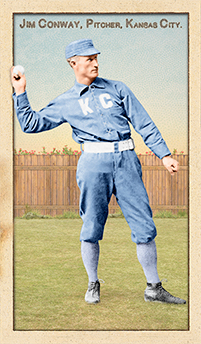
- Series: Beginnings: 1880's
- City: Kansas City
- Team: Blues (WA)
- League: Western Association
James P. Conway (1858-1912) pitched briefly in 1884 and ‘85 for the Brooklyn Atlantics and Philadelphia Athletics of the American Association. He was 3-9 for the Brooklyn and 0-1 for the A’s before returning to the minors, primarily in the Western and Southern leagues. Jim came back up with the Kansas City Blues in 1889 and had a fine season, winning 19 as the ace of a struggling team that finished 7th in the AA. The year before, Jim’s kid brother Pete had won 30 games for the Detroit Wolverines but quickly faded from the game along with Jim who’s arm gave out after that one stellar year. Jim managed to return to the mound after a year’s layoff but went only 8-12 for two minor league clubs in 1891-92.
- It has been speculated that Conway’s demise as a major-league pitcher had more to do with attitude than physical limitations. He was nicknamed “Dark Days” to signify a sour disposition
- Jim was a teammate of Hall-of-Famer Billy Hamilton who stole 111 bases in 1889




